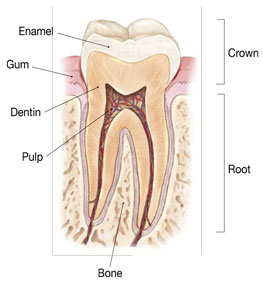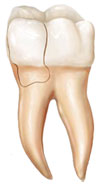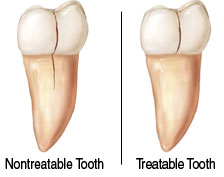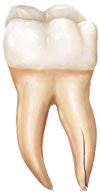With their more sophisticated procedures, dentists are helping people keep their teeth longer. Because people are living longer and more stressful lives, they are exposing their teeth to many more years of crack-inducing habits, such as clenching, grinding and chewing on hard objects. These habits make our teeth more susceptible to cracks.
Cracked teeth show a variety of symptoms, including erratic pain when chewing (possibly with release of biting pressure), or pain when your tooth is exposed to temperature extremes. In many cases, the pain may come and go and your dentist may have difficulty locating which tooth is causing the discomfort.

Craze Lines
Fractured Cusp
 When a cusp (the pointed part of the chewing surface) becomes weakened, a fracture sometimes results. The weakened cusp may break off by itself or may have to be removed by the dentist. When this happens, the pain will usually be relieved. A fractured cusp rarely damages the pulp, so root canal treatment is seldom needed. Your tooth will usually be restored with a full crown by your dentist.
When a cusp (the pointed part of the chewing surface) becomes weakened, a fracture sometimes results. The weakened cusp may break off by itself or may have to be removed by the dentist. When this happens, the pain will usually be relieved. A fractured cusp rarely damages the pulp, so root canal treatment is seldom needed. Your tooth will usually be restored with a full crown by your dentist.
Cracked Tooth
 This crack extends from the chewing surface of the tooth vertically towards the root. A cracked tooth is not completely separated into two distinct segments. Because of the position of the crack, damage to the pulp is common. Root canal treatment is frequently needed to treat the injured pulp. Your dentist will then restore your tooth with a crown to hold the pieces together and protect the cracked tooth. At times, the crack may extend below the gingival tissue line, requiring extraction. A non-treatable tooth is shown in the graphic above.
This crack extends from the chewing surface of the tooth vertically towards the root. A cracked tooth is not completely separated into two distinct segments. Because of the position of the crack, damage to the pulp is common. Root canal treatment is frequently needed to treat the injured pulp. Your dentist will then restore your tooth with a crown to hold the pieces together and protect the cracked tooth. At times, the crack may extend below the gingival tissue line, requiring extraction. A non-treatable tooth is shown in the graphic above.Early diagnosis is important. Even with high magnification and special lighting, it is sometimes difficult to determine the extent of a crack. A cracked tooth that is not treated will progressively worsen, eventually resulting in the loss of the tooth. Early diagnosis and treatment are essential in saving these teeth.
Split Tooth
 A split tooth is often the result of the long term progression of a cracked tooth. The split tooth is identified by a crack with distinct segments that can be separated. A split tooth cannot be saved intact. The position and extent of the crack, however, will determine whether any portion of the tooth can be saved. In rare instances, endodontic treatment and a crown or other restoration by your dentist may be used to save a portion of the tooth.
A split tooth is often the result of the long term progression of a cracked tooth. The split tooth is identified by a crack with distinct segments that can be separated. A split tooth cannot be saved intact. The position and extent of the crack, however, will determine whether any portion of the tooth can be saved. In rare instances, endodontic treatment and a crown or other restoration by your dentist may be used to save a portion of the tooth.
Vertical Root Fracture
 Vertical root fractures are cracks that begin in the root of the tooth and extend toward the chewing surface. They often show minimal signs and symptoms and may therefore go unnoticed for some time. Vertical root fractures are often discovered when the surrounding bone and gum become infected. Treatment may involve extraction of the tooth. However, endodontic surgery is sometimes appropriate if a portion of the tooth can be saved by removal of the fractured root.
Vertical root fractures are cracks that begin in the root of the tooth and extend toward the chewing surface. They often show minimal signs and symptoms and may therefore go unnoticed for some time. Vertical root fractures are often discovered when the surrounding bone and gum become infected. Treatment may involve extraction of the tooth. However, endodontic surgery is sometimes appropriate if a portion of the tooth can be saved by removal of the fractured root.
Unlike a broken bone, the fracture in a cracked tooth will not heal. In spite of treatment, some cracks may continue to progress and separate, resulting in loss of the tooth. Placement of a crown on a cracked tooth provides maximum protection but does not guarantee success in all cases.
The treatment you receive for your cracked tooth is important because it will relieve pain and reduce the likelihood that the crack will worsen. Once treated, most cracked teeth continue to function and provide years of comfortable chewing. Talk to your endodontist about your particular diagnosis and treatment recommendations. S/he will advise you on how to keep your natural teeth and achieve optimum dental health.
While cracked teeth are not completely preventable, you can take some steps to make your teeth less susceptible to cracks.
- Do not chew on hard objects such as ice, unpopped popcorn kernels or pens.
- Do not clench or grind your teeth.
- If you clench or grind your teeth while you sleep, talk to your dentist about getting a retainer or other mouthguard to protect your teeth.
- Wear a mouthguard or protective mask when playing contact sports.
